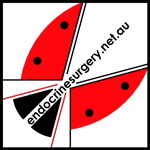Radioactive Iodine Treatment of Thyrotoxicosis
 Radioactive iodine (RAI) is a very safe and effective treatment for thyrotoxicosis; it relies on the ability of thyroid cells to trap the radioactive iodine (given orally as 131I), which destroys them. It can be used in all age groups and is even safe in children, but is completely contraindicated in pregnancy. In addition, patients should not contemplate pregnancy for at least 6 months after treatment. Patients who are breast-feeding must stop doing so before treatment and not continue.
Radioactive iodine (RAI) is a very safe and effective treatment for thyrotoxicosis; it relies on the ability of thyroid cells to trap the radioactive iodine (given orally as 131I), which destroys them. It can be used in all age groups and is even safe in children, but is completely contraindicated in pregnancy. In addition, patients should not contemplate pregnancy for at least 6 months after treatment. Patients who are breast-feeding must stop doing so before treatment and not continue.
Method
Prior to RAI treatment the thyrotoxicosis should be controlled with thionamide drugs, with or without beta-blockers, although some with mild hyperthyroidism will not need this pretreatment. Most guidelines suggest stopping anti-thyroid drugs for three to seven days prior to giving radioactive iodine to increase the uptake of the RAI by thyroid cells. There is a potential down side to this cessation of antithyroid drugs before RAI however, as there is a risk of worsening the thyrotoxicosis.
There are two ways of delivering the radioactive iodine: either a single large dose of radioactive iodine, which destroys the entire thyroid but necessitates early thyroid replacement, or alternatively giving repeated small doses of radioactive iodine, which is tiresome and ultimately will still lead to thyroid replacement. After an ablative dose of radioiodine some 60% of patients will need thyroxine supplementation within a year, and most will eventually need it.
Radioactive iodine dosage is small for thyrotoxicosis, so most patients can have the treatment as an outpatient and go home afterwards. The RAI is given by swallowing a special capsule.
There are very few immediate complications with this small dose, although there is sometimes tenderness in the neck or in the parotids (mumps glands). It is rarely severe however and usually self-limiting.
There is no evidence that radioactive iodine treatment reduces fertility in the male or female. It is considered good practice for females not to become pregnant until at least six months after treatment, and males should follow the same rule, delaying pregnancy in their partners for at least six months.
Post-treatment
Infants and young children need to be kept away from the patient for a period after therapy to prevent damage to the vulnerable young thyroid. Its role is limited in massive toxic goitres, particularly if there is a significant retrosternal element.
Radioiodine therapy does not achieve control of thyroid function immediately (unlike surgery), but continues to act for months after treatment. There is symptomatic improvement after 6-8 weeks, but low-dose thionamide (carbimazole) therapy will be needed for several months in many patients until the RAI has worked. Radioactive iodine does have an initial failure rate of 25% and these patients will need to have another dose after six months.
Eye disease
Radioactive iodine is probably safe for patients with mild thyroid eye disease, but there is concern about its use and it is wise not to use it in patients with severe eye disease as this may worsen. The use of steroids may reduce the risk, but it is probably safer to opt for surgery as definitive treatment.
Summary
Radioactive iodine treatment is very effective and definitive, and is nearly the only remedy when surgery has failed, as redo surgery has a much higher complication rate. An exception to this would be in pregnancy however, when subtotal surgery has failed and antithyroid drugs have not controlled the toxicity.
Radioiodine treatment is very safe, and several large, long-term studies have shown no increased risk of thyroid cancer, leukaemia, other malignancies, reproductive abnormalities or congenital abnormalities in the offspring of treated patients.

